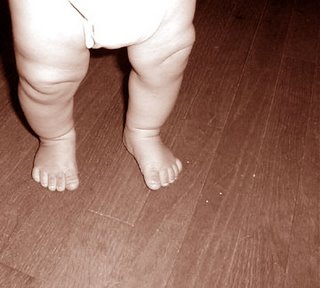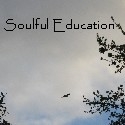"Learning is a process, not the static image provided by an intelligence test. It's an intrinsically hopeful process of improvement. As an animal, I am also perpetually beguiled by the bumbling folly of baby animals, while also understanding what I see is not stupidity, but an early stage of a journey toward grace, competence, and comprehension."
--Becoming a Tiger: How Baby Animals Learn to Live in the Wild, by Susan McCarthy
Kitty Bill, our youngest child, stood up the other day and began to walk. He took two wobbly steps and fell. He pushed himself back up on his fat, little sausage legs and grinned at us. He took two more steps and fell. Undeterred, he stood back up and tried again. By the end of the week he can walk across the room.
Lately, I've been thinking a lot about how we learn new things. Not just how we teach our children, but how we teach ourselves. To me those ideas are connected because our children learn so much from watching us. If learning is a painful process for us... If we curse, or get frustrated when we mess up... If we chuck our knitting or statistics books across the room... If we are easily defeated and give up the first time we take a spill on the ice, they might see those things and adopt them as their own. If we make a fuss, they learn to make a fuss.
The opposite is also true. If we're sure-footed and excited about learning... If we're eager and interested... If we're accepting of new challenges and seek out new learning experiences, they will too. If they see us laugh at our own mistakes, our own follies, our own early attempts at mastering a new skill, and if we don't give up, they learn to try and try again. Of course it won't always happen this way, but we're the biggest role models our children have.
Kitty Bill isn't old enough to feel humiliated when he fails. He's still in that natural, unblemished phase of life where every moment holds some new discovery. In watching him I have to wonder if that's how each one of us started out, on shaky legs but eager to learn and discover. To taste the untasted and explore the unknown, without bias or fear or embarrassment or expectations. Imagine carrying that into adulthood and how empowering that would feel. I'm not saying that at age 35 we should go around mouthing shoes or licking the cat. But if we could hold onto our sense of wonder and eagerness and ride that horse of self-esteem into adulthood, goodness knows what we might accomplish.
As I watch Kitty Bill in this pure state of exploration, I can't help but ask myself where does he go from here? What pitfalls in learning might trip him up, and like ashes on the snow, mar his unfettered sense of discovery? When and how and why does this eagerness and self-motivation start slipping away?
I don't have the answers. I just know that I wasn't always eager to learn. Even in the recent past I have given up because I felt foolish and innane and simply not up to the task. It's not the newness of something that I find daunting, the idea itself. In reality I want to learn everything. I want to be perfect at it the first time out: bowl a 3oo game, play a symphony, hit the ball out of the park. Completely unrealistic, but there it is.
The part that trips me up is the falling. The failing. The making a complete ass out of myself part. If you're not the kind of person that can laugh at yourself, and most people aren't, then the hurdles of learning appear a bit larger than they actually are. It's like looking at your pores with a magnifying glass. Of course you're going to look hideous and pock-marked. But isn't that what we're doing when we critically examine each and every attempt at learning as a separate thing? When we focus too much on one critical aspect and lose sight of the whole, the bigger picture?
Learning isn't like that. That's like focusing on a two inch square of one of Monet's water lilies. We would think it was blurry crap. Maybe he did, too, since he painted so many of them. Maybe he was just trying to get it right. Maybe he didn't know the first one was outstanding. Maybe Manet came along and laughed at him, and said, "You call that a water lily? Ha!" Manet was dead by then, so it would have to have been his ghost. Or what if Rembrandt's ghost came along and fashioned a grade on Monet's water lilies. Imagine Rembrandt, with his exacting eye for the smallest detail, came along and put a big honkin' red F on Monet's sort of hazy way of painting the world.
What if you and I were graded on a daily basis, on each task laid out before us? Overcooking pasta might earn us a C, while forgetting to buy cat litter, yet again, would get a big fat F. Could you imagine living in that world? Two nights ago I finished knitting my first adult sweater. It took me months of agony, and it looks ok. It's not perfect. But I'm proud of it. Who knew I could follow the directions and knit a sweater?! But if some knitting genius came along and gave me a grade on it. If they turned it inside-out and examined every seam I guarantee they would find plenty of mistakes. It would not hold up to that kind of scrutinty. Would I ever dare to knit a sweater, or anything, ever again? If someone graded my first row of stitches, I might not have even tried knitting a dishcloth, let alone a sweater.
Learning is hard work. Those first steps can be traumatizing if we let them be. If we fall off the horse and never get back on, we may never know what it's like to gallop fearlessly on with the wind whipping through our hair. If we don't learn how to overcome our own hurdles, how can we learn to teach?
"Teachers and educators must be patient with their own self-education, with awakening something in the soul that indeed may sprout and grow. You then may be able to make the most wonderful discoveries, but if this is to be so, you must not lose courage in your first endeavors.
"For you see, whenever you undertake a spiritual activity, you always must be able to bear being clumsy and awkward. People who cannot endure being clumsy and doing things stupidly and imperfectly at first never really will be able to do them perfectly in the end out of their own inner self... If once or twice you have succeeded in thinking out a pictoral presentation of a lesson that you see impresses the children, then you will make a remarkable discovery about yourself. You will see that it becomes easier to invent such pictures, that by degrees you become inventive in a way you never dreamed of. But for this you must have the courage to be very far from perfect to begin with."
--The Kingdom of Childhood: Introductory Talks on Waldorf Education, by Rudolph Steiner








Ah, Sara...how I need to read this each and every day, over and over and over, until it is part of my DNA. Learning IS hard work, but what is life without it?
ReplyDeleteI often do not have the courage to admit that I am very far from perfect, even though it is obvious that I am very far from perfect. Such energy spent on creating the ruse of perfection instead of allowing myself the grace and humility of imperfection.
Thanks for the timely reminder!!!
ReplyDeleteBlessings,
Heather - NY
Oh gawd, I've stumbled across your blog and instead of focussing on the lovely form drawing my 6&1/2 year old is doing next to me I've found myself completely engrossed in your journey.
ReplyDeleteThank you, thank you, thank you. You've already gone far ahead of me and your posts are like a comfortable beacon.
Kestrel, you are so sweet! Thank you.
ReplyDelete